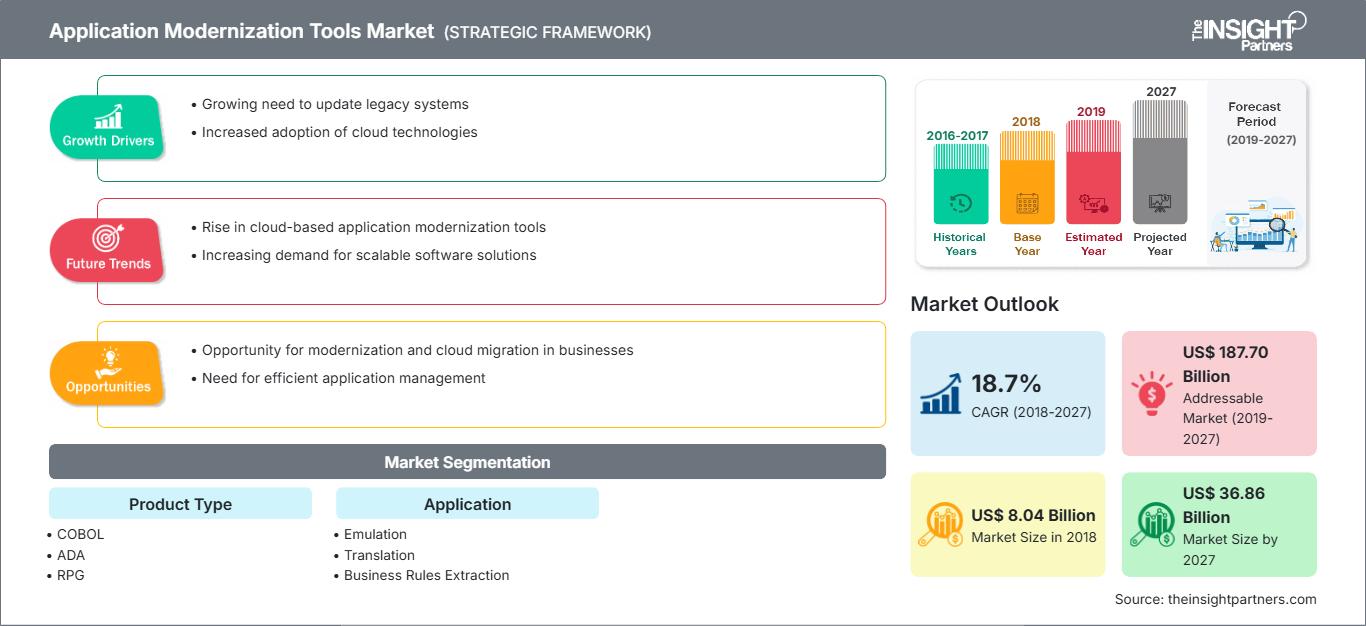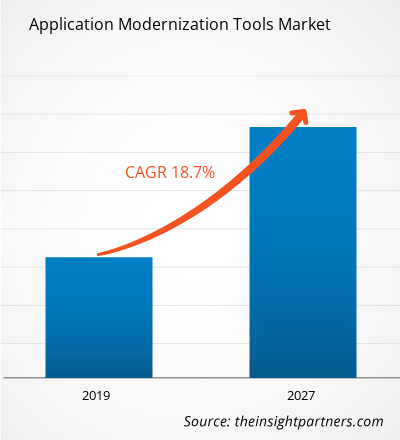Application Modernization Tools Market Key Companies and SWOT Analysis by 2027
Application Modernization Tools Market to 2027 - Industry Analysis and Forecasts by Product Type (COBOL, ADA, RPG, Assembler, PowerBuilder, and Others); Application (Emulation, Translation, and Business Rules Extraction)
Historic Data: 2016-2017 | Base Year: 2018 | Forecast Period: 2019-2027- Report Date : Sep 2019
- Report Code : TIPRE00006650
- Category : Technology, Media and Telecommunications
- Status : Published
- Available Report Formats :


- No. of Pages : 173
The global application modernization tools market accounted at US$ 8.04 Bn in 2018 and is expected to grow at a CAGR of 18.7% during the forecast period 2019 – 2027, to account to US$ 36.86 Bn by 2027.
North America is expected to hold the largest application modernization tools market share by 2027. The governments are maximizing their digital investments by strategically leveraging new technologies, as well as data and advanced analytics, for optimizing policies and programs, and updating their legacy systems. Improving and aligning processes; attracting new investors; bringing smart, data-driven approach in government operations; providing better access to and improving management of information; enhancing citizen satisfaction and trust; transforming government transaction services; and meeting the needs of rapidly changing demographics and balancing cost while optimizing efficiency are all playing major role in the ongoing IT transformation across the government, public, and private sectors.
Market Insights
Increasing digital transformation across the industries is propelling the demand for application modernization tools market
End-to-end business process optimization, increased operational efficiency, improved customer experience, and reduced costs are few of the factors driving the application modernization tools market. The paradigm shift of enterprises from traditional channels to digital and automated channels results in multiple benefits ranging from improved efficiency to reduced cost and increased revenue opportunities, thus bolstering the growth of application modernization tools market.
Customize This Report To Suit Your Requirement
Get FREE CUSTOMIZATIONApplication Modernization Tools Market: Strategic Insights

-
Get Top Key Market Trends of this report.This FREE sample will include data analysis, ranging from market trends to estimates and forecasts.
The high degree of integration with other solutions offer a lucrative opportunity to the application modernization tools market
The players in application modernization tools market are integrating various solutions with the applications and front ended on tablets, mobile, and web. It is a cost-effective and quick way to provide new business processes across any applications. Services providers integrate solutions such as robotic process automation (RPA) which is an as-a-service automation platform. It enables to replicate the interaction of technology and human to automate a wide range of operations and support processes cost-effectively and increases the reliability.
Product Type Insights
The global application modernization tools market by product type was led by COBOL segment. The application modernization process is quite challenging with the traditional methods, but with the adoption of agile technologies, it became easy and more accurate. COBOL is a high-level programming language that generates fully web-based applications and reengineers project within the timeframe, along with executing standards and following specifications for a better look and feel, with the modernization in .NET and Java applications. Various platforms available in the market transform the existing codes into advanced languages.
Application Insights
The global application modernization tools market by application was led by emulation segment in 2018. Also, the segment is expected to hold the largest application modernization tools market share by 2027. Emulation is a process to rehost/re-platform the modernization approach used to provide an environment that compiles on distributed platforms by emulating the legacy operating environment. The emulation capability reduces the amount, and the changes occurred at the time when the legacy system migrates to a distributed platform. The emulation process offers the fastest technique to migrate workloads off a mainframe and a comparatively low-cost, low-risk way to decrease the operating costs as well as uphold the business value. These factors expected to upsurge the demand for emulation applications in application modernization tools market.
Application Modernization Tools Market Regional InsightsThe regional trends and factors influencing the Application Modernization Tools Market throughout the forecast period have been thoroughly explained by the analysts at The Insight Partners. This section also discusses Application Modernization Tools Market segments and geography across North America, Europe, Asia Pacific, Middle East and Africa, and South and Central America.
Application Modernization Tools Market Report Scope
| Report Attribute | Details |
|---|---|
| Market size in 2018 | US$ 8.04 Billion |
| Market Size by 2027 | US$ 36.86 Billion |
| Global CAGR (2018 - 2027) | 18.7% |
| Historical Data | 2016-2017 |
| Forecast period | 2019-2027 |
| Segments Covered |
By Product Type
|
| Regions and Countries Covered |
North America
|
| Market leaders and key company profiles |
|
Application Modernization Tools Market Players Density: Understanding Its Impact on Business Dynamics
The Application Modernization Tools Market is growing rapidly, driven by increasing end-user demand due to factors such as evolving consumer preferences, technological advancements, and greater awareness of the product's benefits. As demand rises, businesses are expanding their offerings, innovating to meet consumer needs, and capitalizing on emerging trends, which further fuels market growth.

- Get the Application Modernization Tools Market top key players overview
The market players present in application modernization tool market are mainly focusing on product enhancements by implementing advance technologies. Few of the recent developments are listed below:
- 2019 : Atos announced the enhancement of Atos Managed OpenShift (AMOS) platform, with the help of new integrated automation features from the SyntBots automation platform. This up-gradation is a result of the collaboration between Atos and Red Hat.
- 2018 : Micro Focus announced the general availability of Visual Enterprise Suite 4.0 and COBOL 4.0, marking a key step in implementing its digital transformation vision to facilitate customers to update core business processes as well as technology.
- 2017 : Blu Age announced its partnership with Advanced, for offering its game-changing solution - COBOL Migration and data modernization to Advanced. With this partnership, the company delivers its automated solution for transforming its legacy COBOL applications to Java and .NET.
Global Application Modernization Tools Market Segmentation
By Product Type
- COBOL
- ADA
- RPG
- Assembler
- PowerBuilder
- Others
By Application
- Emulation
- Translation
- Business Rules Extraction
By Geography
-
North America
- U.S.
- Canada
- Mexico
-
Europe
- France
- Germany
- UK
- Russia
- Italy
- Rest of Europe
-
Asia Pacific (APAC)
- Australia
- China
- India
- Japan
- South Korea
- Rest of APAC
-
Middle East & Africa (MEA)
- Saudi Arabia
- South Africa
- UAE
- Rest of MEA
-
South America (SAM)
- Brazil
- Argentina
- Rest of SAM
Company Profiles
- Advanced Computer Software Group Limited
- Aspire Systems (India) Pvt. Ltd
- Asysco Software BV
- Atos SE
- Blu Age
- Deloitte Touche Tohmatsu Limited
- FreeSoft, Inc.
- Language Portability Solutions
- Micro Focus International plc
- Mphasis Limited
- Semantic Designs, Incorporated
- SoftwareMining Technologies
- The Software Revolution Inc. (TSRI)
- Virtusa Corporation
Ankita is a dynamic market research and consulting professional with over 8 years of experience across the technology, media, ICT, and electronics & semiconductor sectors. She has successfully led and delivered 100+ consulting and research assignments for global clients such as Microsoft, Oracle, NEC Corporation, SAP, KPMG, and Expeditors International. Her core competencies include market assessment, data analysis, forecasting, strategy formulation, competitive intelligence, and report writing.
Ankita is adept at handling complete project cycles—from pre-sales proposal design and client discussions to post-sales delivery of actionable insights. She is skilled in managing cross-functional teams, structuring complex research modules, and aligning solutions with client-specific business goals. Her excellent communication, leadership, and presentation abilities have enabled her to consistently deliver value-driven outcomes in fast-paced and evolving market environments.
- Historical Analysis (2 Years), Base Year, Forecast (7 Years) with CAGR
- PEST and SWOT Analysis
- Market Size Value / Volume - Global, Regional, Country
- Industry and Competitive Landscape
- Excel Dataset
Recent Reports
Testimonials
The Insight Partners' SCADA System Market report is comprehensive, with valuable insights on current trends and future forecasts. The team was highly professional, responsive, and supportive throughout. We are very satisfied and highly recommend their services.
RAN KEDEM Partner, Reali Technologies LTDsI requested a report on a very specific software market and the team produced the report in a few days. The information was very relevant and well presented. I then requested some changes and additions to the report. The team was again very responsive and I got the final report in less than a week.
JEAN-HERVE JENN Chairman, Future AnalyticaWe worked with The Insight Partners for an important market study and forecast. They gave us clear insights into opportunities and risks, which helped shape our plans. Their research was easy to use and based on solid data. It helped us make smart, confident decisions. We highly recommend them.
PIYUSH NAGPAL Sr. Vice President, High Beam GlobalThe Insight Partners delivered insightful, well-structured market research with strong domain expertise. Their team was professional and responsive throughout. The user-friendly website made accessing industry reports seamless. We highly recommend them for reliable, high-quality research services
YUKIHIKO ADACHI CEO, Deep Blue, LLC.This is the first time I have purchased a market report from The Insight Partners.While I was unsure at first, I visited their web site and felt more comfortable to take the risk and purchase a market report.I am completely satisfied with the quality of the report and customer service. I had several questions and comments with the initial report, but after a couple of dialogs over email with their analyst I believe I have a report that I can use as input to our strategic planning process.Thank you so much for taking the extra time and making this a positive experience.I will definitely recommend your service to others and you will be my first call when we need further market data.
JOHN SUZUKI President and Chief Executive Officer, Board Director, BK TechnologiesI wish to appreciate your support and the professionalism you displayed in the course of attending to my request for information regarding to infectious disease IVD market in Nigeria. I appreciate your patience, your guidance, and the fact that you were willing to offer a discount, which eventually made it possible for us to close a deal. I look forward to engaging The Insight Partners in the future, all thanks to the impression you have created in me as a result of this first encounter.
DR CHIJIOKE ONYIA MANAGING DIRECTOR, PineCrest Healthcare Ltd.Reason to Buy
- Informed Decision-Making
- Understanding Market Dynamics
- Competitive Analysis
- Identifying Emerging Markets
- Customer Insights
- Market Forecasts
- Risk Mitigation
- Boosting Operational Efficiency
- Strategic Planning
- Investment Justification
- Tracking Industry Innovations
- Aligning with Regulatory Trends




















 Get Free Sample For
Get Free Sample For